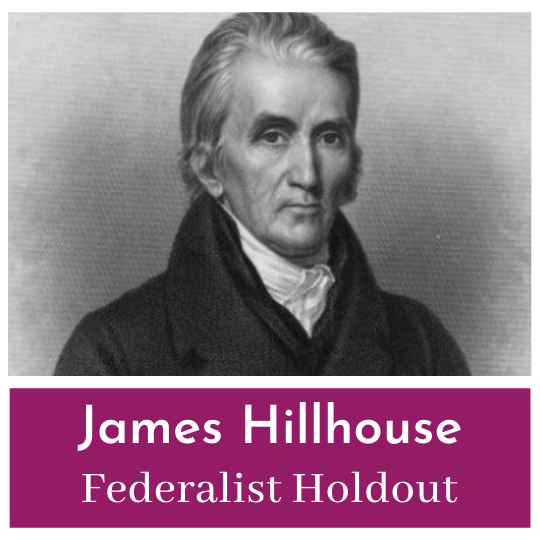Rufus King - The Final Federalist
Updated 9/4/21
Rufus King was a Constitution Signer and the most prominent Federalist during the waning days of the party.
To be fair, John Marshall could also be considered the Last Federalist as he was still sitting on the Supreme Court five years after King's death. However, Marshall was put in that seat 34 years earlier, while the Federalists were still a powerhouse in the American political system.
King, on the other hand, was pushing the Federalists forward despite their slow, inevitable decline.
Revolutionary
Rufus King was 22 years old when he halted his studies to fight in the Revolutionary War.
King, being from a moderately wealthy family, was quickly positioned as a Major and became an aide-de-camp to General John Sullivan.
After his short stint fighting with the Continental Army, King was elected to the Massachusetts General Court (AKA the State Assembly). When the Revolution ended, Rufus began to represent his State in the Continental Congress.
Constitutional Convention
In 1787, Massachusetts chose Rufus King as a Delegate to the Constitutional Convention.
Despite being one of the youngest members, King played an active part in the creation of the federal government.
He served on the Committee of Postponed Parts which tried to find resolutions to difficult questions that were stalled in the Convention.
Additionally, King sat on the Committee of Style and Arrangement. This small group of Representatives crafted the language of the Constitution as we know it today.
New York
King signed the Constitution and shortly thereafter returned to Massachusetts, pushing for his State to ratify the document.
He would not stay in Massachusetts for long, however, as Alexander Hamilton convinced him to relocate to New York and pursue politics full time. This he did, and the transplant was soon elected to represent his new home in the first session of the United States Senate.
King continued to serve as a Senator for seven years, only resigning when asked by President Washington to represent the United States as Minister to Great Britain.
Minister to Great Britain
Rufus King stood as Minister to Great Britain for the next seven years, continuing in this position through the John Adams Presidency.
Despite being a Federalist, King was left to continue in the position by Democratic-Republican Thomas Jefferson when he took over as President. This speaks to how respected he was by his peers for the work he was doing (and to the fact that Britain would prefer to be speaking with a Federalist).
By 1803, King resigned by his own choosing to return to the States.
Vice-Presidential Candidate
In the 1804 and 1808 elections, Rufus King was nominated as the Federalist Candidate for the Vice-Presidency, both times on a ticket with Charles Cotesworth Pinckney.
Both times they were beaten, first by Jefferson and second by James Madison. (The Jefferson victory is still, to this day, the biggest landslide victory in American history.)
Semi-Candidate
King played a small part in the 1812 presidential election as well. The War of 1812 had begun and the Federalist Party, with its anti-war stance, was extremely unpopular.
James Madison was running against a member of his own party, DeWitt Clinton. A prominent New York politician, the Federalists decided to support Clinton as they believed he held their best interests at heart and was the only person who had a chance to win that they would be happy with.
Rufus King thought the wounded Federalists would be better off nominating their own candidate, even if they lost. His unsuccessful attempt to have a Federalist candidate did not go unnoticed and he received 2% of the popular vote, the only party member to garner any support.
Presidential Campaign
By 1816 things had really gone bad for the Federalists.
They had called the Hartford Convention, a Connecticut meeting to discuss Constitutional Amendments specifically aimed at embarrassing Madison. It just so happened that as this meeting concluded, word arrived that Andrew Jackson had won the Battle of New Orleans and, therefore, the War of 1812.
In the public mind, the word Federalist became (especially in the Mid-Atlantic and Southern States) synonymous with treason.
The Federalists decided to take one final shot at control of the United States.
They nominated Rufus King for President.
The Party's Over
King would lose the election to James Monroe. He only carried the States of Massachusetts, Connecticut and Delaware.
This was the last time the Federalist Party would nominate a person for president. They had lost all of their power on the national stage and would soon dwindle out on the State level as well.
America’s first political party was dead.
Afterwards
As for Rufus King, 30 years had passed since he stood on the floor of Independence Hall and assisted in the creation of the United States Constitution.
Now an elder statesman, he was supported by the Democratic-Republicans in New York to return to the US Senate. This ploy to gain the support of former Federalists worked and King spent six more years in Washington, DC.
He would later be sent by President John Quincy Adams to reprise his role as Minister to Great Britain. However, aging and ill, he once again returned to the United States. He spent his final years in his adopted home of New York.
Do you enjoy these articles about Forgotten Founders?
Support Founder of the Day buy picking up one of these new shirts!
It is just one of a handful of products I’ve begun offering recently.
If you'd like to receive a new Founder right to your inbox every morning, please subscribe to our email list.
If you're interested in reading more about Rufus King, there is only one biography about him that I know of: 'Rufus King: American Federalist.' You can purchase it here on Amazon and although we do get a commission, that is not affecting the price.













